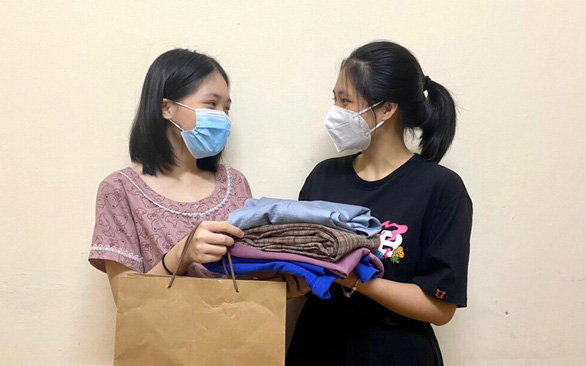Seeing the adverse environmental impact of discarded garments on their city, a group of Hanoi youngsters has launched ‘The Green Closet,’ a project that strives to turn one's old clothes into another’s treasures.
The project was started by a group of volunteers who frequently sought clothes to donate to disadvantaged households, mainly those of ethnic minorities, in Vietnam’s northern upland area.
During their previous charitable work, the group realized that their approach was not the most optimized one, as many beneficiaries found the clothes they received ill-fitting or alien to their culture.
“Many people have old clothes they want to donate, but they also want the garments to reach the right person and prove effective to them," said Nguyen Thi Nhung, 28, founder of The Green Closet.
“That was the reason why our project was founded -- to gather old clothes that are still perfectly usable and bring them to people in need.”
With an initial vision in mind, Nhung and her friends started fleshing out the project in late 2019 for an eco-friendly idea competition.
The project outlines three approaches that correspond to three demographics: people looking to donate clothes, people who pursue uses of handed-down clothes for environmental purposes, and those struggling financially.
The initiative will hold regular campaigns to collect old clothes in good condition from the first group, while the second group will be featured as volunteers who take pictures of second-hand pieces and upload them onto social media for sale.
Revenue from this process will eventually be invested into charity programs that benefit disadvantaged households, specifically ones in the northern highland area.
Taking care of earth
After months of incubation, Nhung launched the project in late 2020 with just five core team members and VND8 million ($353) of funding.
Shortly after the launch, they were immediately faced with continued eruptions of COVID-19 in Hanoi, which hindered their work in clothes sourcing and delivering.
The public’s concern over environmental issues seemingly waned during the pandemic, Nhung stated.
However, Nhung and her group pressed on with ideas in cyberspace, including quiz competitions, writing contests on environmental protection, as well as sharing of styling tips and tricks, which helped promote their core operation and sourcing and selling second-hand clothes.
So far, their team has grown to 20 members, most of whom are students with a shared vision of promoting a sustainable lifestyle in Hanoi.
Pham Huyen Trang, 21, project coordinator, said she heard about eco-friendly practices such as reusing and recycling clothes but had never committed to it until she became a part of The Green Closet.
“People who seek to pursue second-hand clothes as a lifestyle is often stigmatized as ‘stingy,’ ‘cheap,’ or ‘unfashionable’,” Trang said.
“We want to help change that perception, as wearing second-hand simply means that we want to limit our impact on the environment.”
Speaking of her eco-friendly journey, Nhung admitted that she used to be a ‘slave’ of consumption with a hoarding tendency.
However, her life reached a watershed moment when she heard about the environmentally-friendly approach from a friend.
“Gen Z [aged 16-25] youths are very conscious about environmental issues," she said.
“They have access to a wide range of information, and are very creative individuals.
“Once youths become agents of change to spread eco-friendliness practices to the public, our situation will change for the better.”
Like us on Facebook or follow us on Twitter to get the latest news about Vietnam!



















































